Related Research Articles

Mongolia is a landlocked country in East Asia, bordered by Russia to the north and China to the south. It covers an area of 1,564,116 square kilometres, with a population of just 3.3 million, making it the world's most sparsely populated sovereign state. Mongolia is the world's largest landlocked country that does not border a closed sea, and much of its area is covered by grassy steppe, with mountains to the north and west and the Gobi Desert to the south. Ulaanbaatar, the capital and largest city, is home to roughly half of the country's population.

The politics of Mongolia takes place in a framework of a semi-presidential multi-party representative democracy. Executive power is exercised by the prime minister, who is the head of government, and the Cabinet. The president is the head of state, but holds limited authority over the executive branch of the government, unlike full presidential republics like the United States. Legislative power is vested in parliament. The judiciary is independent of the executive and the legislature.
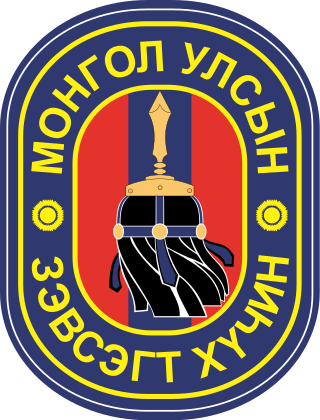
The Mongolian Armed Forces is the collective name for the Mongolian military and the joint forces that comprise it. It is tasked with protecting the independence, sovereignty, and territorial integrity of Mongolia. Defined as the peacetime configuration, its current structure consists of five branches: the Mongolian Ground Force, Mongolian Air Force, Construction and Engineering Forces, cyber security, and special forces. In case of a war situation, the Border Troops, Internal Troops and National Emergency Management Agency can be reorganized into the armed forces structure. The General Staff of the Mongolian Armed Forces is the main managing body and operates independently from the Ministry of Defence, its government controlled parent body.
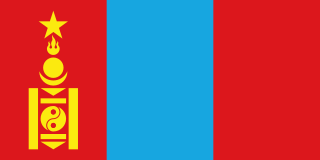
The Mongolian People's Republic was a socialist state which existed from 1924 to 1992, located in the historical region of Outer Mongolia in East Asia. Until 1990, it was a one-party state ruled by the Mongolian People's Revolutionary Party, and maintained close political and economic ties with the Soviet Union, as part of the Eastern Bloc. Socialist collectivization, industrialization, and urbanization transformed Mongolia's agrarian, nomadic economy of the 1920s into a developing, agricultural-industrial economy by the late 1980s.

Khorloogiin Choibalsan was a Mongolian politician who served as the leader of Mongolian People's Republic as chairman of the Council of Ministers (premier) from 1939 until his death in 1952. He was also commander-in-chief of the Mongolian People's Army from 1937, and chairman of the Presidium of the State Little Khural from 1929 to 1930. A close ally of Joseph Stalin, Choibalsan led a dictatorship and organized Stalinist purges in Mongolia between 1937 and 1939 as head of the Ministry of Internal Affairs, executing tens of thousands of Mongolian citizens.

Anandyn Amar was the head of state of the Mongolian People’s Republic from 1932 to 1936 and twice served as prime minister from 1928–1930 and again from 1936–1939. A widely respected politician, Amar was known for his eloquent defense of Mongolian independence in the face of increasing Soviet domination. Despite this, he proved powerless in preventing Minister of Interior Khorloogiin Choibalsan and the Soviet NKVD from carrying out mass purges of nearly 30,000 Mongolians during his second term as prime minister between 1937 and 1939. Amar's popularity ultimately led to his purge by the pro-Soviet Choibalsan who had him charged with counterrevolution in 1939. Amar was sent to Moscow for trial and executed on July 10, 1941.

Sanjaasuren Oyun, also transcribed S. Oyun, is a Mongolian politician and geologist. She is the leader of the Civil Will Party, is the former Minister of Environment and Green Development, and has been a Member of Parliament of Mongolia since 1998. She is also a former Minister of Foreign Affairs and is the current head of the Zorig Foundation. Now she is new head of Global Water Partnership GWP. In 2003, Eisenhower Fellowships awarded Oyun a fellowship program in the United States. In 2006, Oyun was selected as a Young Global Leader (YGL) by the Davos World Economic Forum (WEF). She has been an active member of the YGL community since. On June 24, 2014, Oyun was elected the first president of the United Nations Environment Assembly (UNEA).
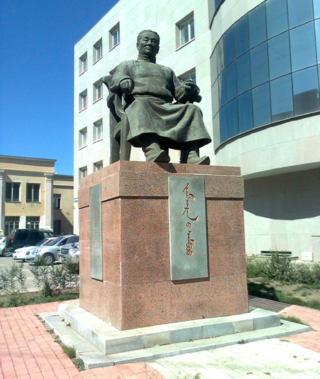
Jamsrangiin Sambuu was a Mongolian politician and diplomat who, as chairman of the presidium of the Mongolian People's Republic People's Great Khural, served as the effective president of the Mongolian People's Republic from 1954 until his death in 1972.
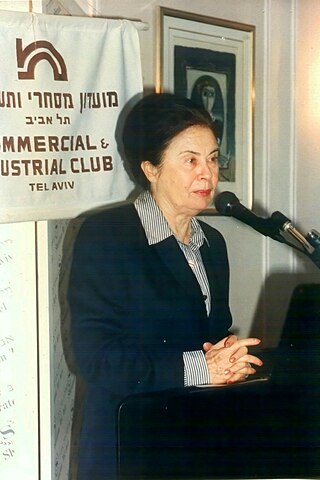
Ora Namir was an Israeli politician and diplomat who served as a member of the Knesset from 1974 until 1996, as well as holding the posts of Minister of the Environment and Minister of Labour and Social Welfare during the 1990s. She later became the country's ambassador to China and Mongolia.
India–Mongolia relations, also known as Indian-Mongolian relations or Indo-Mongolian relations, are bilateral relations between the democratic republics of India and Mongolia. These relations are rapidly developing, with Indo-Mongolian cooperation formerly limited to diplomatic visits, provision of soft loans and financial aid and the collaborations in the IT sector; but were enhanced in 2015 by Narendra Modi's visit to Ulaanbaatar, where the two Prime Ministers declared a "strategic partnership" between the two Asian democracies.

Sheikh Saad Al-Abdullah Al-Salim Al-Sabah was the Emir of Kuwait from January 15 until his abdication on January 24 2006, succeeding Sheikh Jaber Al-Ahmad Al-Jaber Al-Sabah.

Shirnengiin Ayuush was a Mongolian composer, novelist and art historian, one of the leading composers of Mongolia in the 1930s.
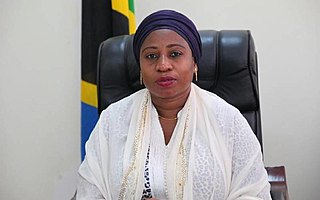
Ummy Ally Mwalimu is a Tanzanian politician belonging to the ruling Chama Cha Mapinduzi (CCM) party. She is currently a Member of Parliament for Tanga Constituency and also serves as the Minister of Health, Seniors and Children. She has held various cabinet positions since 2010. She is a third-term Member of Parliament, firstly appointed to a seat reserved for women in the parliament of Tanzania in 2010.
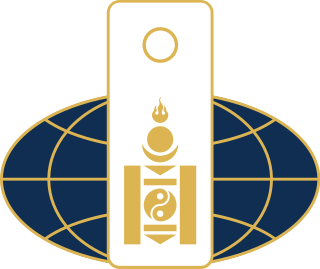
The Ministry of Foreign Affairs of Mongolia (MOFA) (Mongolian: Монгол улсын Гадаад харилцааны яам) is the Mongolian government ministry which oversees the foreign relations of Mongolia and crafts the country's foreign policy.
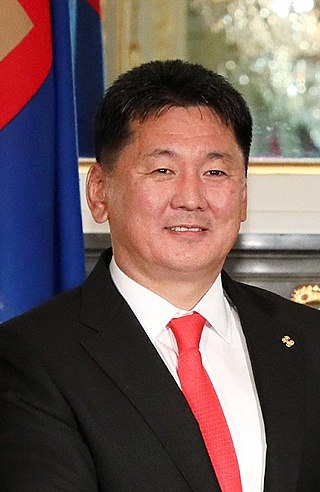
Ukhnaagiin Khürelsükh, also referred to as Khürelsükh Ukhnaa, is the 6th and current president of Mongolia, beginning his term on 25 June 2021 after winning the 2021 Mongolian presidential election. He was prime minister from October 2017 to January 2021 and was elected to the Parliament of Mongolia four times – in 2000, 2004, 2012 and 2020.

The Ministry of Long-Term Care is the Government of Ontario ministry responsible for administering the long-term care system and providing related services in the Canadian province of Ontario.

The COVID-19 pandemic in Mongolia was a part of the ongoing worldwide pandemic of coronavirus disease 2019 caused by severe acute respiratory syndrome coronavirus 2. The COVID-19 pandemic was confirmed to have reached Mongolia when its first case was confirmed in a French man who traveled from Moscow to Dornogovi on 10 March 2020.

Tsagaan Puntsag is a Mongolian entrepreneur, international lawyer, economist, philanthropist, and a former politician.

Battsetseg Batmunkh is the Minister of Foreign Affairs of Mongolia since 2021. She holds a Bachelor of Arts in International Relations from the National University of Mongolia in 1996, a Bachelor of Business Administration from the University of Finance and Economics of Mongolia in 2000 and a Master of Business Administration from Maastricht School of Management in 2005. Previously she has served in various executive positions at Munkhiin Useg Group, and as Deputy Minister for Foreign Affairs. She speaks Mongolian, English and Russian.
Gerel Ochir is a Mongolian geologist. She specializes in petrology, geochemistry, and metallogeny. She has taught at the Mongolian University of Science and Technology for over 50 years and headed the Department of Geology for 30 years.
References
- ↑ "Эрүүл мэнд, анагаах ухааны салбарын түүхийг бүтээлцсэн эмэгтэйчүүд". www.unen.mn. 2021-03-08. Retrieved 2021-10-01.